反义疑问句(最全)
- 格式:ppt
- 大小:152.00 KB
- 文档页数:1
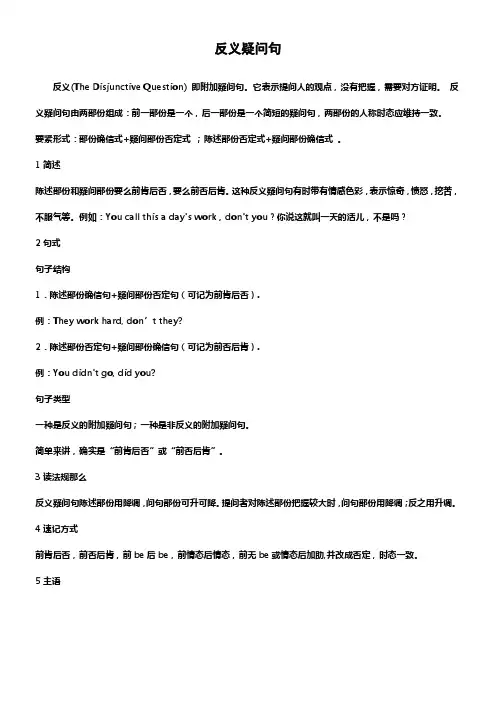
反义疑问句反义(The Disjunctive Question) 即附加疑问句。
它表示提问人的观点,没有把握,需要对方证明。
反义疑问句由两部份组成:前一部份是一个,后一部份是一个简短的疑问句,两部份的人称时态应维持一致。
要紧形式:部份确信式+疑问部份否定式;陈述部份否定式+疑问部份确信式。
1简述陈述部份和疑问部份要么前肯后否,要么前否后肯。
这种反义疑问句有时带有情感色彩,表示惊奇,愤怒,挖苦,不服气等。
例如:You call this a day's work,don't you?你说这就叫一天的活儿,不是吗?2句式句子结构1.陈述部份确信句+疑问部份否定句(可记为前肯后否).例:They work hard, don’t they?2.陈述部份否定句+疑问部份确信句(可记为前否后肯).例:You didn't go, did you?句子类型一种是反义的附加疑问句;一种是非反义的附加疑问句。
简单来讲,确实是“前肯后否”或“前否后肯”。
3读法规那么反义疑问句陈述部份用降调,问句部份可升可降。
提问者对陈述部份把握较大时,问句部份用降调;反之用升调。
4速记方式前肯后否,前否后肯,前be后be,前情态后情态,前无be或情态后加助,并改成否定,时态一致。
5主语一样词语附加疑问句中用和主句一致的主语,用。
附加疑问句侍从句。
不定代词当陈述部份的主语是(1)one时,后面的可用one/he.(2)no one时,后面附加疑问句中主语用they。
(3)everything,anything,nothing,something时,附加疑问句中主语用it 不用they(4)this, that,或those, these时,附加疑问句中主语用it或they.(5)everyone,everybody,someone,somebody,anyone,nobody等时,附加疑问句中主语一样用they(口头语,非正式文体)/he(正式文体)。
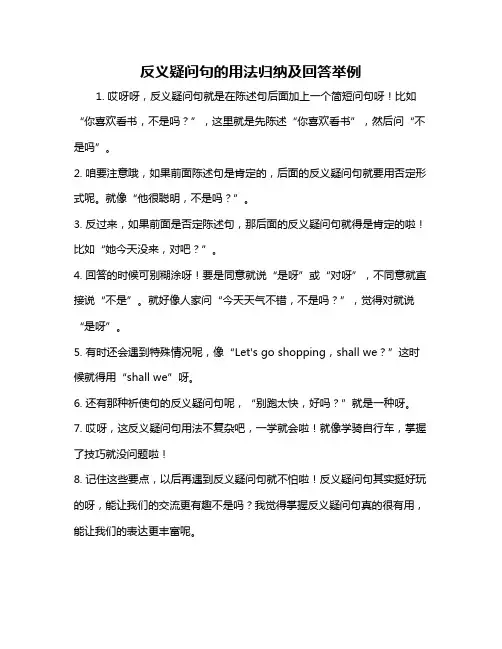
反义疑问句的用法归纳及回答举例
1. 哎呀呀,反义疑问句就是在陈述句后面加上一个简短问句呀!比如“你喜欢看书,不是吗?”,这里就是先陈述“你喜欢看书”,然后问“不是吗”。
2. 咱要注意哦,如果前面陈述句是肯定的,后面的反义疑问句就要用否定形式呢。
就像“他很聪明,不是吗?”。
3. 反过来,如果前面是否定陈述句,那后面的反义疑问句就得是肯定的啦!比如“她今天没来,对吧?”。
4. 回答的时候可别糊涂呀!要是同意就说“是呀”或“对呀”,不同意就直接说“不是”。
就好像人家问“今天天气不错,不是吗?”,觉得对就说“是呀”。
5. 有时还会遇到特殊情况呢,像“Let's go shopping,shall we?”这时候就得用“shall we”呀。
6. 还有那种祈使句的反义疑问句呢,“别跑太快,好吗?”就是一种呀。
7. 哎呀,这反义疑问句用法不复杂吧,一学就会啦!就像学骑自行车,掌握了技巧就没问题啦!
8. 记住这些要点,以后再遇到反义疑问句就不怕啦!反义疑问句其实挺好玩的呀,能让我们的交流更有趣不是吗?我觉得掌握反义疑问句真的很有用,能让我们的表达更丰富呢。
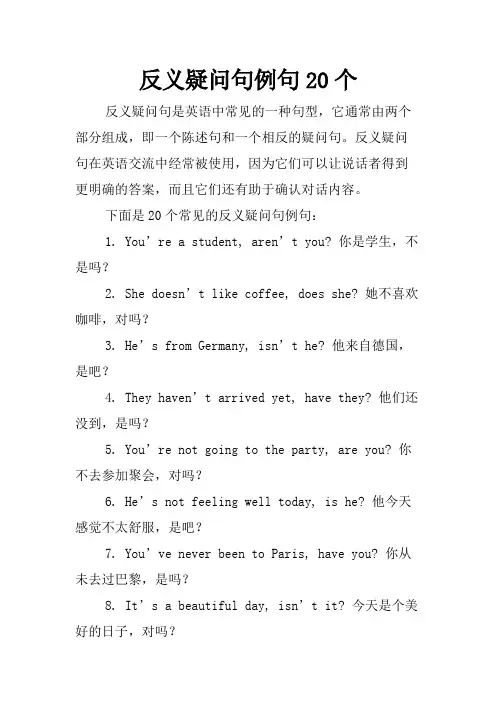
反义疑问句例句20个反义疑问句是英语中常见的一种句型,它通常由两个部分组成,即一个陈述句和一个相反的疑问句。
反义疑问句在英语交流中经常被使用,因为它们可以让说话者得到更明确的答案,而且它们还有助于确认对话内容。
下面是20个常见的反义疑问句例句:1. You’re a student, aren’t you? 你是学生,不是吗?2. She doesn’t like coffee, does she? 她不喜欢咖啡,对吗?3. He’s from Germany, isn’t he? 他来自德国,是吧?4. They haven’t arrived yet, have they? 他们还没到,是吗?5. You’re not going to the party, are you? 你不去参加聚会,对吗?6. He’s not feeling well today, is he? 他今天感觉不太舒服,是吧?7. You’ve never been to Paris, have you? 你从未去过巴黎,是吗?8. It’s a beautiful day, isn’t it? 今天是个美好的日子,对吗?9. He can’t swim, can he? 他不会游泳,对吗?10. She doesn’t like pizza, does she? 她不喜欢披萨,对吗?11. You’re not afraid of heights, are you? 你不怕高,对吗?12. They won’t be able to attend the meeting, will they? 他们不能参加会议,对吗?13. They’re leaving tomorrow, aren’t they? 他们明天要走了,对吗?14. He’s never been skiing, has he? 他从未滑过雪,对吗?15. She’s not going to the concert, is she? 她不去音乐会,对吗?16. You’re not worried about the exam, are you? 你不担心考试吧,对吗?17. He didn’t eat breakfast this morning, did he? 他今天早上没吃早餐,对吗?18. They’r e not going to the beach, are they? 他们不去海边,对吗?19. You’ve already seen the movie, haven’t you? 你已经看过这部电影了,对吗?20. He’s not coming to the party, is he? 他不来参加聚会,对吗?在使用反义疑问句时,需要注意的是,它们并不总是表示对话者的不确定或疑虑。
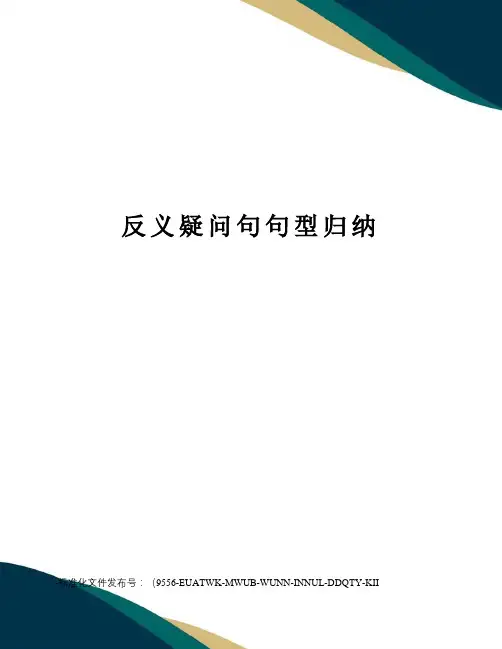
反义疑问句句型归纳-标准化文件发布号:(9556-EUATWK-MWUB-WUNN-INNUL-DDQTY-KII反义疑问句句型归纳1、You had no time for reading, did you\ had you?2、He has a bro ther, hasn’t he, \ doesn’t he?3、We have to go without him, don’t we4、You have you r dinner at school, don’t you?5、He has a res t every two hours, doesn’t he?6、This is your last chance to learn from the beginning, isn’t it?7、Those were terrible days f or us to recall, weren’t they?8、There are some books you ar e interested in, aren’t there?9、Let us do it as we please \ like to, will you \ can you10、Let’s us do it right now, shall we \ can we11、Come here, will you\ won’t you \ can you \ c an’t you \ do you \ don’t you?12、Don’t say anything, will you \ can you \ do you13、Tom, you clean the window, will you?14、I think \ say \suppose \ guess \ am sure he will come back soon, won’t he?15、I don’t think he will come back , will he?16、He old man never thought he was lonely, did he?17、The old man used to be a f armer, usedn’t he \ didn’t he?18、He ought to come, oughtn’t he \ shouldn’t?19、He seldom goes to the cin ema, doesn’t he?( hardly, never, few, little, nothing, nobody)20、It’s unfair, isn’t it?21、One can’t be car eful enough, can one \ can he?22、Eve rything goes well, doesn’t it?23、Everybody agrees with him, doesn’t he \ don’t they?24、All we needed has bee n bought, hasn’t it?25、All we invited have arrived, haven’t they(All refers to people)26、Learning E nglish is very hard, isn’t it?27、He studies hard and he is often prai sed by his teachers, isn’t he?28、We must be more polite in this occasion, needn’t w e?29、He must be a brave man, isn’t he?30、It must have rained last night, didn’t it?31、He mush hav e known the answer, hasn’t he?32、He can’t have done such a foolish thing, has he?33、I am a student, aren’t I34、So he has known the secret, has he?35、Oh, you have the same type of sell phone as I, do you一、反意疑问句的意义及其构成反意疑问句又叫附加疑问句,是指当提问的人对前面所叙述的事实不敢肯定,而需要向对方加以证实时所提出的问句。
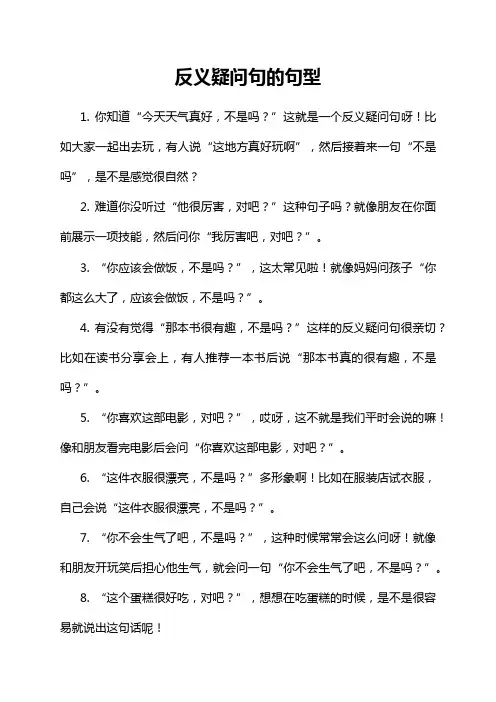
反义疑问句的句型
1. 你知道“今天天气真好,不是吗?”这就是一个反义疑问句呀!比如大家一起出去玩,有人说“这地方真好玩啊”,然后接着来一句“不是吗”,是不是感觉很自然?
2. 难道你没听过“他很厉害,对吧?”这种句子吗?就像朋友在你面前展示一项技能,然后问你“我厉害吧,对吧?”。
3. “你应该会做饭,不是吗?”,这太常见啦!就像妈妈问孩子“你都这么大了,应该会做饭,不是吗?”。
4. 有没有觉得“那本书很有趣,不是吗?”这样的反义疑问句很亲切?比如在读书分享会上,有人推荐一本书后说“那本书真的很有趣,不是吗?”。
5. “你喜欢这部电影,对吧?”,哎呀,这不就是我们平时会说的嘛!像和朋友看完电影后会问“你喜欢这部电影,对吧?”。
6. “这件衣服很漂亮,不是吗?”多形象啊!比如在服装店试衣服,自己会说“这件衣服很漂亮,不是吗?”。
7. “你不会生气了吧,不是吗?”,这种时候常常会这么问呀!就像和朋友开玩笑后担心他生气,就会问一句“你不会生气了吧,不是吗?”。
8. “这个蛋糕很好吃,对吧?”,想想在吃蛋糕的时候,是不是很容易就说出这句话呢!
9. “他肯定能做好,不是吗?”,就好像对别人充满信心时会说“他那么厉害,肯定能做好,不是吗?”。
10. “你已经准备好了,对吧?”,比如要去参加一个活动,会问伙伴“你已经准备好了,对吧?”。
我的观点结论:反义疑问句在我们的日常交流中真的太常见啦,它能让对话更自然、更亲切,也能更好地表达我们的情感和态度。
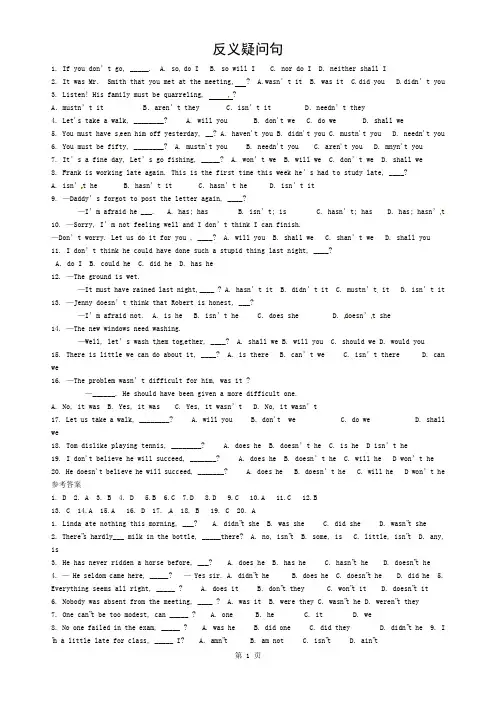
反义疑问句1. If you don’t go, _____. A. so do I B. so will I C. nor do I D. neither shall I2. It was Mr. Smith that you met at the meeting, ? A.wasn’t it B. was it C.did you D.didn’t you3. Listen! His family must be quarreling, ?A.mustn’t it B.aren’t they C.isn’t it D.needn’t they4. Let's take a walk, ________? A. will you B. don't we C. do we D. shall we5. You must have s een him off yesterday, __? A. haven't you B. didn't you C. mustn't you D. needn't you6. You must be fifty, ________? A. mustn't you B. needn't you C. aren't you D. mnyn't you7. It’s a fine day, Let’s go fishing, _____? A. won’t we B. will we C. don’t we D. shall we8. Frank is working late again. This is the first time this week he’s had t o study late, ____?A. isn’t heB. hasn’t itC. hasn’t heD. isn’t it9. —Daddy’s forgot to post the letter again, ____?—I’m afraid he ___. A. has; has B. isn’t; is C. hasn’t; has D. has; hasn’t 10. —Sorry, I’m not feeling well and I don’t think I can finish.—Don’t worry. Let us do it for you , ____? A. will you B. shall we C. shan’t we D. shall you11. I don’t think he could have done such a stupid thing last night, ____?A. do IB. could heC. did heD. has he12. —The ground is wet.—It must have rained last night,____ ? A. hasn’t it B. didn’t it C. mustn’t it D. isn’t it 13. —Jenny doesn’t think that Robert is honest, ___?—I’m afraid not. A. is he B. isn’t he C. does she D. doesn’t she14. —The new windows need washing.—Well, let’s wash t hem tog ether, ____? A. shall we B. will you C. should we D. would you15. There is little we can do about it, ____? A. is there B. can’t we C. isn’t there D. can we16. —The problem wasn’t difficult for him, was it ?—______. He should have been given a more difficult one.A. No, it wasB. Yes, it wasC. Yes, it wasn’tD. No, it wasn’t17. Let us take a walk, ________? A. will you B. don't we C. do we D. shall we18. Tom dislike playing tennis, ________? A. does he B. doesn’t he C. is he D isn’t he19. I don't believe he will succeed, _______? A. does he B. doesn’t he C. will he D won’t he20. He doesn't believe he will succeed, _______? A. does he B. doesn’t he C. will he D won’t he 参考答案1. D2. A3. B4. D5.B6.C7.D8.D9.C 10.A 11.C 12.B13. C 14.A 15.A 16. D 17. A 18. B 19. C 20. A1. Linda ate nothing this morning, ___? A. didn‟t she B. was she C. did she D. wasn‟t she2. There‟s hardly___ milk in the bottle, _____there? A. no, isn‟t B. some, is C. little, isn‟t D. any, is3. He has never ridden a horse before, ___? A. does he B. has he C. hasn‟t he D. doesn‟t he4. — He seldom came here, _____? — Yes sir. A. didn‟t he B. does he C. doesn‟t he D. did he5. Everything seems all right, _____ ? A. does it B. don‟t they C. won‟t it D. doesn‟t it6. Nobody was absent from the meeting, ____ ? A. was it B. were they C. wasn‟t he D. weren‟t they7. One can‟t be too modest, can _____ ? A. one B. he C. it D. we8. No one failed in the exam, _____ ? A. was he B. did one C. did they D. didn‟t he 9. I ‟m a little late for class, _____ I? A. amn‟t B. am not C. isn‟t D. ain‟t10. Neither you nor I am a artist, _____ ? A. am I B. aren‟t we C. are we D. ain‟t I11. He can‟t be her father, _____ he? A. is B. isn‟t C. can D. can‟t12. They have no time to visit the museum, __ ? A. do they B. haven‟t they C. don‟t they D. will they13. You have John do the work, _____? A. do you B. don‟t you C. haven‟t you D. have you14. You‟d better go at once, _____ you? A. hadn‟t B. did C. didn‟t D. don‟t 15. You ‟d rather work than play, _____ you? A. hadn‟t B. wouldn‟t C. didn‟t D. mustn‟t16. You dare not do that, _____ you? A. don‟t B. do C. dare D. daren‟t17. You must be tired, _____ you? A. mustn‟t B. needn‟t C. aren‟t D. can‟t18. He dislikes the two subjects, _____ he? A. does B. doesn‟t C. is D. isn‟t19. These tools are useless now, _____ ? A. are they B. aren‟t they C. is it D. isn‟t it20. He used to get up at 6:30, _____ he? A. didn‟t he B. did he C. used he D. wouldn‟t he21. I wish to go home early, _____ I? A. can B. must C. may D. do22. He ought to win the first prize, _______ he? A. mustn‟t B. oughtn‟t C. shouldn‟t D. Both B and C.23. Let‟s go there by bus, ___? A. will you B. shall we C. don‟t you D. will you24. Let us go to play football, ___? A. will you B. shall we C. do we D. are we25. Don‟t forget to give Polly some food and change her water,__?A. will youB.shall weC. won‟t youD. do you26. — Let‟s go shopping this afternoon, __? — All right. A. will we B. shall we C. don‟t we D. are we27. — Pass me the dictionary, ___ you? — Yes, with pleasure. A. would B. will C. won‟t D. wouldn‟t 28. — What beautiful weather, _____ ? — Yes, it is. A. is it B. isn‟t it C. am I right D. do you agree29. What kind people, _____ they? A. aren‟t B. are C. won‟t D. will30. There is little water in the glass, ____? A. isn‟t there B. isn‟t it C. is it D. is there31. — They don‟t seem to answer the phone. — There isn‟t anybody at home, _____?A. isn‟t thereB. is thereC. isn‟t itD. is it32. There won‟t be any concert this Saturday evening, ___ ?A. will there notB. will thereC. is thereD. won‟t33. — I guess she taught herself Japanese, ______? — Yes. A. don‟t I B. did she C. do I D. didn‟t she34. I don‟t believe you are right, _____ ? A. are you B. do you C. won‟t you D. do35. She doesn‟t think that Tom sings best in the class, __? A. does she B. doesn‟t she C. does he D. doesn‟t he 36. I told you that everybody couldn‟t do it well, _____ ? A. didn‟t I B. could they C. could he D. did I37. I know you didn‟t want to hurt me, _____ ? A. did you B. didn‟t you C. do I D. don‟t I38. If my father were here he would be very happy, __ ? A. weren‟t he B. were he C. wouldn‟t he D. would he 1—5 CDBDD 6—10 BACDC 11—15 AABAB 16—20 CCBBA 21—25CDBAA 26—30 BBBAD 31—35 BBDAA 36—38 AAC1. You’d rather watch TV this evening, ______?a. isn’t it b. hadn’t you c. wouldn’t you d. won’t you2. I suppose you’re not going today, ______? a. are you b. do you c. don’t you d. aren’t you3. I wish to shake hands with you, ______? a. shall b. may I c. do I d. will I4. Three hours ought to be enough time, ______?a. oughtn’t three hoursb. didn’t theyc. shouldn’t itd. shouldn’t three hours5. They have to study a lot, ______? a. don’t they b. haven’t they c. did they d. hadn’t they6. When the car crashed, your brother escaped being hurt, ______ ?a. didn’t heb. did hec. did itd. didn’t it7. I'm sure dirty, ______? a. am I b. isn’t I c. aren’t I d. am not I8. You seem to be dissatisfied with your present post. I don’t think you judged your ability objecti vely when you applied for it, ______ you? a. do b. did c. don’t d. didn’t9. That’s the sort of the book you want, ______? a. is it d. isn’t that c. is that d. isn’tit10. All these dictionaries are a great help to you, ______?a. are theyb. aren’t theyc. are all these dictionariesd. aren’t all these dictionaries11. The movie that we saw last week was quite interesting, ______?a. wasn’t itb. was itc. didn’t wed. weren’t we12. Tom has been writing letters all afternoon, but he should have finished them by now,______? a. hasn’t he b. has he c. shouldn’t he d. didn’t you13. David told me that you would take a trip to America, ______?a. would youb. woul dn’t youc. did youd. didn’t you14. There appeared to be no better way, ___? a. was there b. were therec. did thered. didn’t there15. You has some trouble finding where I live, ____? a. didn’t you b. hadn’t you c. doI d. don’t I16. He has his hair cut every month, ______? a. has he b. hasn’t he c. does he d. doesn’t he17. Your friend needs to come earlier, __? a. does he b. doesn’t he c. need he d. needn’t he18. The little boy dare not go to church, ___? a. dare he b. daren’t he c. does he d. doesn’t he19. Susan’d have worked abroad if she’d had the chance, ______?a. has sheb. hadn’t shec. would shed. wouldn’t she20. Everyone’s having a good time, ______? a. is he b. isn’t everyone c. does he d. aren’t they21. Any one can join the club, ______? a. can any one b. can’t any one c. can’t they d. can they22. Tell me how to operate the electronic computer, ___? a. will you b. shan’t you c. do you d. don’t you23. Magaret scarcely comes to visit you on Christmas Day, ______?a. doesn’t sheb. does shec. do youd. don’t you24. Let’s listen to the radio program that the teacher mentioned, ______?a. do web. don’t wec. shall wed. shan’t we25. You think you’re funny, ______? a. didn’t you b. are you c. don’t you d. do you26. Janet used to take part in labor in that village, ___? a. used she b. did she c. didn’t she d. should she27. What beautif ul weather, ______? a. is it b. isn’t it c. won’t it d. doesn’t it28. He ought to go to Kwangchow by plane, ______? a. should he b. shouldn’t he c. would he d. wouldn’t he29. We never dared to ask him a question, ______? a. did we b. didn’t we c. dared we d. daren’t we30. Nobody will believe how difficult his work has been ______?a. will heb. won’t nobodyc. will theyd. won’t they31. You must have made the mistake, __? a. mustn’t you b. haven’t you c. didn’t you d. hadn’t you32. Learning how to repair computers takes a long time, ______?a. isn’t itb. aren’t theyc. doesn’t itd. don’t they33. Jack has coffee with breakfast, ___? a. hasn’t Jack b. hasn’t he c. doesn’t Jack d. doesn’t he34. They must have stayed at hotel last night, ____?a. mustn’t theyb. haven’t theyc. didn’t theyd. hadn’t they35. There isn’t anything wrong with the radio, ______? a. is there b. is it c. does it d. does there36. You must be hungry, ______? a. must you b. mustn’t you c. are you d. aren’t you37. Let’s do the exercises by ourselves, ______? a. shall we b. shan’t we c. will you d. will we38. Her daughter had the carpets and curtains cleaned, ______?a. had sh eb. hadn’t shec. didn’t shed. didn’t her daughter39. The teacher had a talk with you, ______? a. has you b. hadn’t she c. did she d. didn’t she40. Something’ll have to be done about the air pollution, ______?a. won’t itb. will itc. has itd. does it1 C 19 D 37 A2 A 20 D 38 C3 B 21 C 39 D4 C 22 A 40 A5 A 23 B 41 6A 24 C 42 7 C 25 D 43 8B 26C 44 9D 27 B 45。
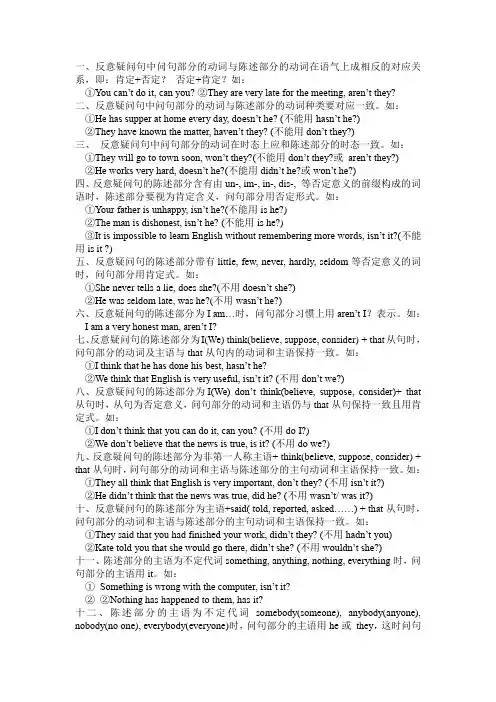
一、反意疑问句中问句部分的动词与陈述部分的动词在语气上成相反的对应关系,即:肯定+否定?否定+肯定?如:①You can’t do it, can you? ②They are very late for the meeting, aren’t they?二、反意疑问句中问句部分的动词与陈述部分的动词种类要对应一致。
如:①He has supper at home every day, doesn’t he? (不能用hasn’t he?)②They have known th e matter, haven’t they? (不能用don’t they?)三、反意疑问句中问句部分的动词在时态上应和陈述部分的时态一致。
如:①They will go to town soon, won’t they?(不能用don’t they?或aren’t they?)②He works very hard, doesn’t he?(不能用didn’t he?或won’t he?)四、反意疑问句的陈述部分含有由un-, im-, in-, dis-, 等否定意义的前缀构成的词语时,陈述部分要视为肯定含义,问句部分用否定形式。
如:①Your father is unhappy, isn’t he?(不能用is he?)②The man is dishonest, isn’t he? (不能用is he?)③It is impossible to learn English without remembering more words, isn’t it?(不能用is it ?)五、反意疑问句的陈述部分带有little, few, never, hardly, seldom等否定意义的词时,问句部分用肯定式。
如:①She never tells a lie, does she?(不用doesn’t she?)②He was seldom late, was he?(不用wasn’t he?)六、反意疑问句的陈述部分为I am…时,问句部分习惯上用aren’t I?表示。
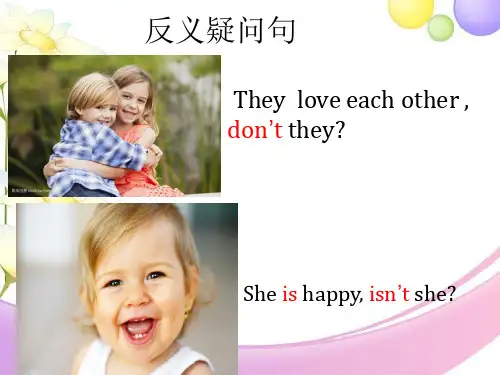
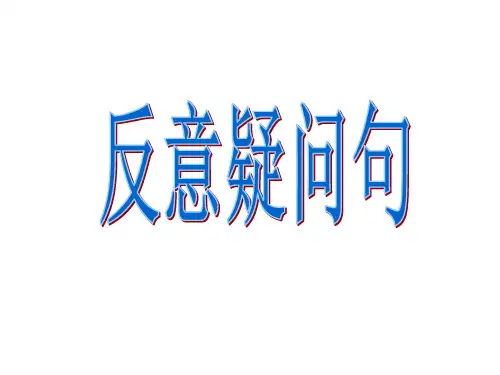
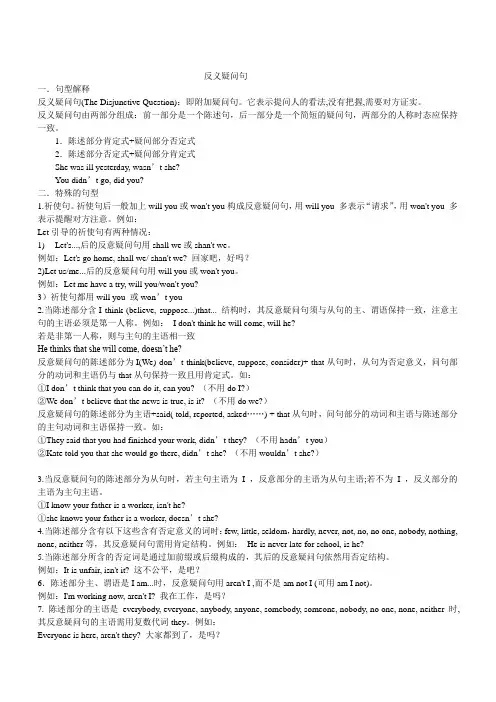
反义疑问句一.句型解释反义疑问句(The Disjunctive Question):即附加疑问句。
它表示提问人的看法,没有把握,需要对方证实。
反义疑问句由两部分组成:前一部分是一个陈述句,后一部分是一个简短的疑问句,两部分的人称时态应保持一致。
1.陈述部分肯定式+疑问部分否定式2.陈述部分否定式+疑问部分肯定式She was ill yesterday, wasn’t she?You didn’t go, did you?二.特殊的句型1.祈使句。
祈使句后一般加上will you或won't you构成反意疑问句,用will you 多表示“请求”,用won't you 多表示提醒对方注意。
例如:Let引导的祈使句有两种情况:1) Let's...,后的反意疑问句用shall we或shan't we。
例如:Let's go home, shall we/ shan't we? 回家吧,好吗?2)Let us/me...后的反意疑问句用will you或won't you。
例如:Let me have a try, will you/won't you?3)祈使句都用will you 或won’t you2.当陈述部分含I think (believe, suppose...)that... 结构时,其反意疑问句须与从句的主、谓语保持一致,注意主句的主语必须是第一人称。
例如:I don't think he will come, will he?若是非第一人称,则与主句的主语相一致He thinks that she will come, doesn’t he?反意疑问句的陈述部分为I(We) don’t think(believe, suppose, consider)+ that从句时,从句为否定意义,问句部分的动词和主语仍与that从句保持一致且用肯定式。
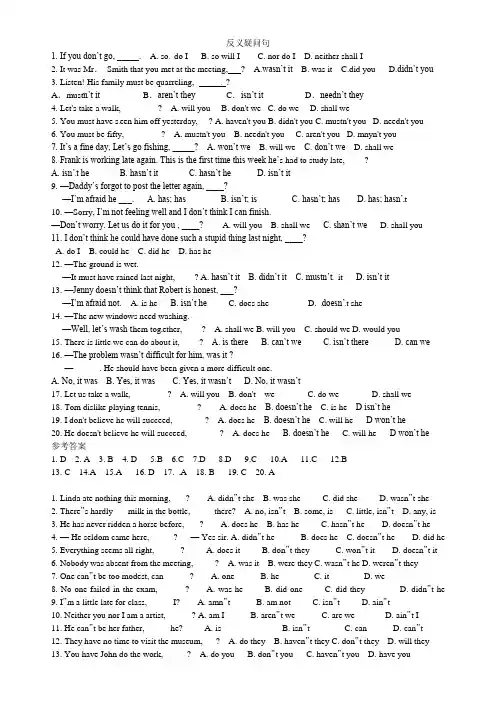
反义疑问句1. If you don’t go, _____. A. so do I B. so will I C. nor do I D. neither shall I2. It was Mr.Smith that you met at the meeting, ? A.wasn’t it B. was it C.did you D.didn’t you3. Listen! His family must be quarreling, ?A.must n’t it B.aren’t they C.isn’t it D.needn’t they4. Let's take a walk, ________? A. will you B. don't we C. do we D. shall we5. You must have s een him off yesterday, __? A. haven't you B. didn't you C. mustn't you D. needn't you6. You must be fifty, ________? A. mustn't you B. needn't you C. aren't you D. mnyn't you7. It’s a fine day, Let’s go fishing, _____? A. won’t we B. will we C. don’t we D. shall we8. Frank is working late again. This is the first time this week he’s had to study late, ____?A. isn’t heB. hasn’t itC. hasn’t heD. isn’t it9. —Daddy’s forgot to post the letter again, ____?—I’m afraid he ___. A. has; has B. isn’t; is C. hasn’t; has D. has; hasn’t10. —Sorry, I’m not feeling well and I don’t think I can finish.—Don’t worry. Let us do it for you , ____? A. will you B. shall we C. shan’t we D. shall you11. I don’t think he could have done such a stupid thing last night, ____?A. do IB. could heC. did heD. has he12. —The ground is wet.—It must have rained last night,____ ? A. hasn’t it B. didn’t it C. mustn’t it D. isn’t it13. —Jenny doesn’t think that Robert is honest, ___?—I’m afraid not. A. is he B. isn’t he C. does she D. doesn’t she14. —The new windows need washing.—Well, let’s wash t hem tog ether, ____? A. shall we B. will you C. should we D. would you15. There is little we can do about it, ____? A. is there B. can’t we C. isn’t there D. can we16. —The problem wasn’t difficult for him, was it ?—______. He should have been given a more difficult one.A. No, it wasB. Yes, it wasC. Yes, it wasn’tD. No, it wasn’t17. Let us take a walk, ________? A. will you B. don't we C. do we D. shall we18. Tom dislike playing tennis, ________? A. does he B. doesn’t he C. is he D isn’t he19. I don't believe he will succeed, _______? A. does he B. doesn’t he C. will he D won’t he20. He doesn't believe he will succeed, _______? A. does he B. doesn’t he C. will he D won’t he参考答案1. D2. A3. B4. D5.B6.C7.D8.D9.C 10.A 11.C 12.B13. C 14.A 15.A 16. D 17. A 18. B 19. C 20. A1. Linda ate nothing this morning, ___? A. didn‟t she B. was she C. did she D. wasn‟t she2. There‟s hardly___ milk in the bottle, _____there? A. no, isn‟t B. some, is C. little, isn‟t D. any, is3. He has never ridden a horse before, ___? A. does he B. has he C. hasn‟t he D. doesn‟t he4. — He seldom came here, _____? — Yes sir. A. didn‟t he B. does he C. doesn‟t he D. did he5. Everything seems all right, _____ ? A. does it B. don‟t they C. won‟t it D. doesn‟t it6. Nobody was absent from the meeting, ____ ? A. was it B. were they C. wasn‟t he D. weren‟t they7. One can‟t be too modest, can _____ ? A. one B. he C. it D. we8. No one failed in the exam, _____ ? A. was he B. did one C. did they D. didn‟t he9. I‟m a little late for class, _____ I? A. amn‟t B. am not C. isn‟t D. ain‟t10. Neither you nor I am a artist, _____ ? A. am I B. aren‟t we C. are we D. ain‟t I11. He can‟t be her father, _____ he? A. is B. isn‟t C. can D. can‟t12. They have no time to visit the museum, __ ? A. do they B. haven‟t they C. don‟t they D. will they13. You have John do the work, _____? A. do you B. don‟t you C. haven‟t you D. have you14. You‟d better go at once, _____ you? A. hadn‟t B. did C. didn‟t D. don‟t15. You‟d rather work than play, _____ you? A. hadn‟t B. wouldn‟t C. didn‟t D. mustn‟t16. You dare not do that, _____ you? A. don‟t B. do C. dare D. daren‟t17. You must be tired, _____ you? A. mustn‟t B. needn‟t C. aren‟t D. can‟t18. He dislikes the two subjects, _____ he? A. does B. doesn‟t C. is D. isn‟t19. These tools are useless now, _____ ? A. are they B. aren‟t they C. is it D. isn‟t it20. He used to get up at 6:30, _____ he? A. didn‟t he B. did he C. used he D. wouldn‟t he21. I wish to go home early, _____ I? A. can B. must C. may D. do22. He ought to win the first prize, _______ he? A. mustn‟t B. oughtn‟t C. shouldn‟t D. Both B and C.23. Let‟s go there by bus, ___? A. will you B. shall we C. don‟t you D. will you24. Let us go to play football, ___? A. will you B. shall we C. do we D. are we25. Don‟t forget to give Polly some food and change her water,__?A. will youB.shall weC. won‟t youD. do you26. — Let‟s go shopping this afternoon, __? — All right. A. will we B. shall we C. don‟t we D. are we27. — Pass me the dictionary, ___ you? — Yes, with pleasure. A. would B. will C. won‟t D. wouldn‟t28. — What beautiful weather, _____ ? — Yes, it is. A. is it B. isn‟t it C. am I right D. do you agree29. What kind people, _____ they? A. aren‟t B. are C. won‟t D. will30. There is little water in the glass, ____? A. isn‟t there B. isn‟t it C. is it D. is there31. — They don‟t seem to answer the phone. — There isn‟t anybody at home, _____?A. isn‟t thereB. is thereC. isn‟t itD. is it32. There won‟t be any concert this Saturday evening, ___ ?A. will there notB. will thereC. is thereD. won‟t33. — I guess she taught herself Japanese, ______? — Yes. A. don‟t I B. did she C. do I D. didn‟t she34. I don‟t believe you are right, _____ ? A. are you B. do you C. won‟t you D. do35. She doesn‟t think that Tom sings best in the class, __? A. does she B. doesn‟t she C. does he D. doesn‟t he36. I told you that everybody couldn‟t do it well, _____ ? A. didn‟t I B. could they C. could he D. did I37. I know you didn‟t want to hurt me, _____ ? A. did you B. didn‟t you C. do I D. don‟t I38. If my father were here he would be very happy, __ ? A. weren‟t he B. were he C. wouldn‟t he D. would he1—5 CDBDD 6—10 BACDC 11—15 AABAB 16—20 CCBBA 21—25CDBAA 26—30 BBBAD 31—35 BBDAA 36—38 AAC1. You’d rather watch TV this evening, ______?a. isn’t it b. hadn’t you c. wouldn’t you d. won’t you2. I suppose you’re not going today, ______? a. are you b. do you c. don’t you d. aren’t you3. I wish to shake hands with you, ______? a. shall b. may I c. do I d. will I4. Three hours ought to be enough time, ______?a. oughtn’t three hoursb. didn’t theyc. shouldn’t itd. shouldn’t three hours5. They have to study a lot, ______? a. don’t they b. haven’t they c. did they d. hadn’t they6. When the car crashed, your brother escaped being hurt, ______ ?a. didn’t heb. did hec. did itd. didn’t it7. I'm sure dirty, ______? a. am I b. isn’t I c. aren’t I d. am not I8. You seem to be dissatisfied with your present post. I don’t think you judged your ability ob jectively when you applied for it, ______ you? a. do b. did c. don’t d. didn’t9. That’s the sort of the book you want, ______? a. is it d. isn’t that c. is that d. isn’t it10. All these dictionaries are a great help to you, ______?a. are theyb. aren’t theyc. are all these dictionariesd. aren’t all these dictionaries11. The movie that we saw last week was quite interesting, ______?a. wasn’t itb. was itc. didn’t wed. weren’t we12. Tom has been writing letters all afternoon, but he should have finished them by now,______? a. hasn’t he b. has he c. shouldn’t he d. didn’t you13. David told me that you would take a trip to America, ______?a. would youb. wouldn’t youc. did youd. didn’t you14. There appeared to be no better way, ___? a. was there b. were there c. did there d. didn’t there15. You has some trouble finding where I live, ____? a. didn’t you b. hadn’t you c. do I d. don’t I16. He has his hair cut every month, ______? a. has he b. hasn’t he c. does he d. doesn’t he17. Your friend needs to come earlier, __? a. does he b. doesn’t he c. need he d. needn’t he18. The little boy dare not go to church, ___? a. dare he b. daren’t he c. does he d. doesn’t he19. Susan’d have worked abroad if she’d had the chance, ______?a. has sheb. hadn’t shec. would shed. wouldn’t she20. Everyone’s having a good time, ______? a. is he b. isn’t everyone c. does he d. aren’t they21. Any one can join the club, ______? a. can any one b. can’t any one c. can’t they d. can they22. Tell me how to operate the electronic computer, ___? a. will you b. shan’t you c. do you d. don’t you23. Magaret scarcely comes to visit you on Christmas Day, ______?a. doesn’t sheb. does shec. do youd. don’t you24. Let’s listen to the radio program that the teacher mentioned, ______?a. do web. don’t wec. shall wed. shan’t we25. You think you’re funny, ______? a. didn’t you b. are you c. don’t you d. do you26. Janet used to take part in labor in that village, ___? a. used she b. did she c. didn’t she d. should she27. What beautiful weat her, ______? a. is it b. isn’t it c. won’t it d. doesn’t it28. He ought to go to Kwangchow by plane, ______? a. should he b. shouldn’t he c. would he d. wouldn’t he29. We never dared to ask him a question, ______? a. did we b. didn’t we c. dared we d. daren’t we30. Nobody will believe how difficult his work has been ______?a. will heb. won’t nobodyc. will theyd. won’t they31. You must have made the mistake, __? a. mustn’t you b. haven’t you c. didn’t you d. hadn’t you32. Learning how to repair computers takes a long time, ______?a. isn’t itb. aren’t theyc. doesn’t itd. don’t they33. Jack has coffee with breakfast, ___? a. hasn’t Jack b. hasn’t he c. doesn’t Jack d. doesn’t he34. They must have stayed at hotel last night, ____?a. mustn’t theyb. haven’t theyc. didn’t theyd. hadn’t they35. There isn’t anything wrong with the radio, ______? a. is there b. is it c. does it d. does there36. You must be hungry, ______? a. must you b. mustn’t you c. are you d. aren’t you37. Let’s do the exercises by ourselves, ______? a. shall we b. shan’t we c. will you d. will we38. Her daughter had the carpets and curtains cleaned, ______?a. had sheb. had n’t shec. didn’t shed. didn’t her daughter39. The teacher had a talk with you, ______? a. has you b. hadn’t she c. did she d. didn’t she40. Something’ll have to be done about the air pollution, ______?a. won’t itb. will itc. ha s itd. does it1 C 19 D 37 A2 A 20 D 38 C3 B 21 C 39 D4 C 22 A 40 A 5A 23B 41 6 A 24C 42 7 C 25D 43 8 B 26 C 44 9 D27 B 45。
反义疑问句超详细讲解反义疑问句⼀、基本要点1、概念。
反义疑问句是疑问句的⼀种,它对陈述部分的事实提出相反的疑问,形式上是⼀个省略问句,附加在陈述句后通常译为“是吗?”形式:主句(陈述句),从句(问句)?You are from America, aren’t you?2、回答。
情况属实:Yes, I am/情况不属实:No, I’m not3、从句动词与主句动词在语⽓上是相反的关系,即:“前肯后否,前否后肯”①You can’t do it, can you?②They are very late for the meeting, aren’t they?【注意】:主句带有little, few, never, hardly, seldom,nobody, nothing, barely, scarcely等否定意义的词时,从句⽤肯定式。
①She never tells a lie, does she? ②He was seldom late, was he?⼆、⼀般构成法1、当主句含有be动词,助动词,或情态动词时,从句由这些词+主语⼈称代词构成。
be动词:am, is, are, was, were助动词:do, does, did, have, has等情态动词:can, could, may, might, must, will, would, shall, shouldShe is a lovely girl, isn’t she?He will go home, won’t he?She doesn’t like to eat apple, does she?The baby won’t sleep early, will it?【注意】:前后主语要相同。
2、当主句只有实义动词(⾏为动词)时,从句⽤do的适当形式。
(若动词加了s,就⽤does, 若动词为原形,就⽤do,动词为过去式,则⽤did)。
反义疑问句知识点总结全面反义疑问句主要有以下几个特点:1. 反义疑问句通常由一个肯定或否定的陈述句和一个问句组成。
问句的结构是“否定词+主语+谓语”。
2. 反义疑问句的否定词通常是“isn’t”、“aren’t”、“wasn’t”、“weren’t”、“don’t”、“doesn’t”、“didn’t”、“hasn’t”、“haven’t”、“hadn’t”、“couldn’t”等。
3. 反义疑问句的句式结构是“陈述句+问句”,陈述句和问句之间用逗号分隔。
4. 反义疑问句在语气上往往表示说话者对自己所说的话进行确认或怀疑。
反义疑问句的结构和用法:1. 反义疑问句用于肯定句时,通常使用否定词“isn’t”、“don’t”、“didn’t”、“doesn’t”、“hasn’t”、“hadn’t”等结构。
例如:You are coming to the party tonight, aren’t you?2. 反义疑问句用于否定句时,通常使用肯定结构“is”、“do”、“does”、“has”、“have”等。
例如:You don’t like chocola te, do you?3. 反义疑问句还可以根据陈述句的时态、人称等进行变换。
例如:She had been to the museum last week, hadn’t she?4. 反义疑问句在口语中用得较多,可以用来表示说话者的确信、怀疑或请求对方确认。
例如:You are studying English, aren’t you?5. 反义疑问句还可以用在陈述句后对自己说过的话进行确认或怀疑。
例如:I am right, aren’t I?反义疑问句与其他疑问句的区别:反义疑问句既带有陈述意义,也带有疑问意义。
与其他疑问句相比,反义疑问句在语义上更为复杂,对语境和语气要求更高。
1. 反义疑问句与一般疑问句的区别:一般疑问句主要用来询问对方的意见或情况,语气中立,没有肯定或否定的倾向。
最全反义疑问句练习题1.XXX't watch TV last night。
did he?2.There are twenty girl students in your class。
aren't there?3.Everything is ready for the party。
isn't it?4.They usually play football after school。
don't they?5.Mary made few mistakes in the exam。
did she?6.Lucy had a party last Sunday。
didn't she?7.XXX。
does he?8.Let'XXX。
shall we?9.She's never been to Tokyo。
has she?10.You bought a new computer last week。
didn't you?11.John。
clean your room。
will you?12.Don't et to put the book back on the shelf。
will you?13.E-mail is very popular today。
People seldom write letters now。
do they?14.Our hometown is more beautiful than before。
isn't it?15.She thinks she can get there on time。
can't she?16.She was unhappy when she heard the news。
wasn't she?17.Mary has to go home now。
doesn't she?18.That'XXX。
反意疑问句(精品)反意疑问句反意疑问句是由两部分构成的:前⼀部分是对事物的陈述,后⼀部分是简短的提问,即“陈述句+附加疑问句”。
反意疑问句前后两部分必须遵循“三同⼀反”的原则,即:⼈称相同,动词相同,时态相同,前肯后否,前否后肯。
反意疑问句的答语与⼀般疑问句相同,即肯定回答⽤yes,否定回答⽤no。
但注意在回答“前否后肯”的反意疑问句时,yes译为“不”,no译为“是”。
Your mother is a worker,isn't she?你的母亲是⼀名⼯⼈,是不是?—You won't go to the Summer Palace tomorrow,will you?明天你不去颐和园,是吗?—Yes,I will.不,我要去。
/No,I won't.是的,我不会去。
考点⼀反意疑问句前肯后否,前否后肯。
常见的否定词有not,no,hardly,few,little,never,seldom,nowhere,nothing,nobody,none,too...to...等。
注:带有否定前缀的词不是否定词,如impossible It is impossible,isn't it?He is not unkind to his classmates,is he?考点⼆若陈述句部分的主语是that,this,everything,something,nothing或者主语从句时,疑问句部分的主语⽤it。
若主语部分有these,those,anyone,anybody,everyone,someone,no one,nobody等时,要⽤they。
Everything is arranged in a good order,isn’t it?考点三若陈述句部分为主从复合句,反意疑问部分的主语通常与主句的主语⼀致。
Jenny said she would come tomorrow,didn't she?詹妮说她明天会来,是吗?【提醒】若主句的主语是第⼀⼈称I/we,其谓语动词⼜是think,suppose,expect,believe,imagine等,<即I/We+think/suppose/expect/believe+ that>则反意疑问部分的主语和谓语⼀般应与从句⼀致。
反义疑问句(含解析、例句及详尽用法)-CAL-FENGHAI.-(YICAI)-Company One1反义疑问句一、祈使句的反义疑问句1、肯定祈使句Will you/won’t you2、否定祈使句Will you3、Let的祈使句Let us ...,will you(此处Let us 表示“允许我们...”)Let’s...,shall we (此处Let’s表示“让我们...吧”)Let + 第三人称...,will you二、Must的反义疑问句1、表示“必须” musn’t /needn’tEg. You must go now, needn’t you2、表示“不准”Eg. You musn’t smoke here, must/may you3、表示推测,肯定。
(I’m sure + 从句)Eg. You must be hungry now, aren’t youI’m sure you are hungry now, aren’t youShe must have heard about that, hasn’t sheI’m sure you have heard about that, haven’t youYou must have watched that movie last night, didn’t you(last nigh为具体时间点,所以用一般过去式)三、主语(反义疑问句)+从句主句:I(don’t)think/believe/consider/suppose 或 I’m afraid/sure...后跟从句时,可将从句部分进行反义疑问Eg. I don’t think he will win, will heI think he will win, won’t heShe thinks he will win, doesn’t she(当主句主语不是I时不适用于该用法,此句中的翻译疑问针对的是主句而非从句)四、当句中包含有表示否定意义的副词或不定代词时,反义疑问句用肯定形式Eg. Nothing happened to him, did itIt is unfair, isn’t itHe dislikes watching TV, doesn’t he(该句中含否定意义的是动词而非副词或不定代词,因此不适用于该用法,反义疑问句仍然使用否定形式)五、反义疑问句的回答反义疑问句的回答针对被提问部分的谓语动词,且与回答句前部分的Yes和No 保持一致Eg. A: You haven’t lost the ticket, have youB: D I know it’s hard to get another one at this moment.A. Yes, I haven’tB. No, I haveC. I hope soD. I’m afraid not六、陈述部分的主语与反义疑问句主语保持一致的情况1、OneEg. One can’t be too careful when driving a car, can one/he一个人在开车的时候再怎么小心也不为过。